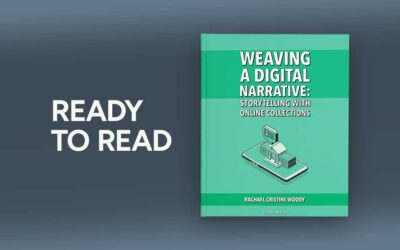How to Incorporate Interns in Museum CMS Projects

Rachael Cristine Woody
The museum Collections Management System (CMS) plays a major role in the workload of collection caretakers.
Museum projects often include reliance on the CMS; however, the museum CMS is only as helpful as the data it contains. If data is missing, incomplete, or incorrect, then the impact of delay or the elongation of work can have a reverberating affect throughout the team. Fortunately, many museum collections management systems are now intuitive enough for interns to access and use with minimal training. Additionally, between security profiles and backups, there’s less risk to incorporating an intern in museum CMS projects. This series of posts will highlight how interns can be included in museum CMS projects with three project ideas to consider for your next intern.
A Note About Interns
First, it’s important to set expectations accurately when integrating interns into our work. Interns are in learning-mode. They’ve usually received some training onsite and have an educational foundation regarding museum digital projects. They may have little to no experience, which is why internships can be so valuable. Internships, by their nature, are short-term (usually 3 to 6-months), but have a regular and consistent rhythm to them. Interns can assist with ongoing tasks that require a moderate level of digital best practice competency. Digitization, digital file management, research, and basic catalog data creation (in the CMS) are all areas where interns can help.
Essentially:
- Internships are centered on the learning experience
- Internships are professional experiences
- Interns are professionals and soon-to-be colleagues
With that in mind, internship projects, the internship experience, and intern compensation are important aspects to consider when structuring how an intern (or interns) may be incorporated into a museum CMS project.
Internship Ethics and Compensation
As professionals who predominantly work in the nonprofit sector, it is important to consider the ethics and compensation an internship entails. Internships must offer a meaningful experience that provides a safe learning space for an intern to gain experience through. Specifically, the internship should include professional-level work as the interns are soon-to-be professionals. In addition to crafting an intentional internship experience, it’s important to account for the time commitment on your part to provide the intern (or interns) with proper training and regular supervision. Finally, internships should be paid and at a fair market-rate. All labor should be paid at a fair market rate. You can find more information and resources in the Additional Reading section at the bottom of this post.
The key ethical standards to incorporate into an internship are:
- Internships are paid
- Internships are meaningful
- Internships include training
- Internships include supervision
With the foundation to a successful internship laid, it’s now time to review museum CMS project ideas and how an intern can be incorporated.
Ideas for Internship Activities within Museum CMS Projects
There are many activities that comprise work in and around the Museum CMS. For example, digitization activities take place outside the CMS with the digital file eventually making its way into the CMS.
Digitization Activities Can Include:
- Object Preparation (for digitization)
- Digitization
- Digital File Management
For the above activities, interns can participate in all of them with the proper training and supervision in place. Each aspect is straightforward and contained. For activities that include the museum CMS, there’s usually multiple steps to perform as well as learning how to navigate and use a database. That’s not to say it can’t be done. In fact, that will be our focus.
We will feature the three main areas of data work in the CMS:
- Data Capture
- Data Creation
- Data Cleanup and Refinement
These three items will serve as our project ideas to explore in more detail over the next few weeks.
Conclusion
Once you establish ethical parameters for your internship program, you can turn your attention to the project ideas you’d like interns to perform. Projects are discrete scopes of work with specific activities to complete in order to produce a set of outcomes. In the following weeks we’ll breakdown each project idea outlined in this post to include suggested scopes of work, activities, and outcomes.
Additional Reading
Posts from Lucidea’s Think Clearly Blog specific to creating paid and ethical internships:
A Year in Review: An Assessment of the 2023 Museum Forecast
How to Create a Meaningful Internship Experience
How to Ethically Build Museum Intern and Volunteer Opportunities
How to Fund a Museum Paid Internship
How Much Should You Pay a Museum Intern?
Why Do Museum Internships Need to be Paid?
Posts from Lucidea’s Think Clearly Blog specific to building projects and training for interns:
Building a Strategy to Catalog an Entire Museum Collection
Effective Technology Training for Museum Volunteers & Interns
Museum Digital Project Roles for Staff, Volunteers, and Interns

Rachael Cristine Woody
To learn more, please join us for a free webinar How to Incorporate Interns in Museum CMS Projects on April 24, 2024 at 11 a.m. Pacific, 2 p.m. Eastern. (Can’t make it? Register anyway and we will send you a link to the recording and slides afterwards). Register now .
Never miss another post. Subscribe today!
Similar Posts
The Amplified Ask: Museum Fundraising Partnerships
Explore three real museum fundraising partnerships and the repeatable elements that make joint campaigns, products, and events successful.
Ready to Read: Weaving a Digital Narrative: Storytelling with Online Collections
Lucidea is excited to release a new book from museum collections expert Rachael Christine Woody.
How Shared Software Systems Can Buoy Museums in Financially Turbulent Times
Adopting shared software systems is a powerful move toward a more efficient and more financially sound museum.
Museum Mergers: A Creative Solution for Financial Constraints
Museum mergers can relieve financial pressure through shared governance, staffing, and resources. Rachael Woody explores examples, benefits, and challenges of these types of partnerships.




Leave a Comment
Comments are reviewed and must adhere to our comments policy.
0 Comments